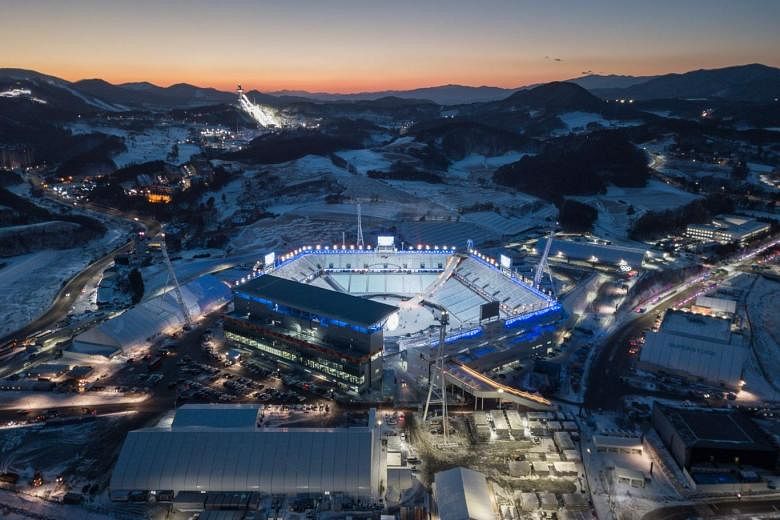TOKYO/SEOUL - Japanese Prime Minister Shinzo Abe will be in South Korea on Friday (Feb 9) to attend the opening ceremony of the Pyeongchang Winter Games.
It is a trip he is making only at the urging of the White House.
The high-level visit comes despite murmurs of disquiet within Japan's ruling Liberal Democratic Party (LDP) that the gesture would send the wrong signal to South Korea. Seoul's persistence in dredging up the longstanding "comfort women" issue caused another flare-up last month after Seoul asked Tokyo to take additional measures.
Mr Abe was reluctant to go at first. But like United States Vice-President Mike Pence, he has been alarmed at the rapid detente between the two Koreas after North Korean leader Kim Jong Un offered to send a delegation to the Games.
South Korean President Moon Jae In is believed to be trying to use the sporting extravaganza to show the international community that tensions with the North are easing. He is expected to seek support for inter-Korean dialogue and efforts to denuclearise North Korea.
North Korea's ceremonial head of state Kim Yong Nam and leader Kim Jong Un's sister Kim Yo Jong will be among 22 high-ranking officials attending the Olympics. Pyongyang has also dispatched a 229-strong cheerleading squad, while the two Koreas have agreed to march together under a unified Korean flag at the opening ceremony and form a unified women's ice hockey team.
"We hope that North Korea's participation in the Olympics and it sending a high level delegation will help improve inter-Korean ties and hopefully create an opportunity to resolve the North Korean nuclear issue peacefully in the future," Mr Moon said during summit talks with Estonian President Kersti Kaljulaid at the presidential Blue House on Tuesday.
But Mr Pence and Mr Abe are expected to jointly press Mr Moon to commit to upholding the maximum pressure strategy that has been espoused by the US and Japan.
The Japanese leader is expected to emphasise that both countries hold the massive Foul Eagle joint military exercises - without any scaling down in size - after the end of the Winter Olympics and Paralympics. The Games start on Friday and ends on Feb 25, while the Paralympics will run from March 9 to 18.
North Korea opposes the drills and describes them as a dress rehearsal for invasion. Concerns prevail that Pyongyang might resume its ballistic missile and nuclear tests after the Games.
Given such anxieties, Mr Abe intends to ask Mr Moon for support in the event that the roughly 38,000 Japanese citizens living in South Korea have to be evacuated.
History will also likely cloud the talks between Mr Abe and Mr Moon. Mr Abe is likely to reiterate Tokyo's stance on the "comfort women" issue, and ask that Seoul abide by the 2015 "final and irreversible" agreement that was negotiated with Mr Moon's predecessor Park Geun Hye.
The two nations are also embroiled in a territorial spat over the Takeshima/Dokdo islands - controlled by South Korea and claimed by Japan - in waters between the two countries.
South Korea last month protested against Japan's launch of a permanent exhibit that highlights its sovereignty over the islands. Japan, too, protested this week after the unified Korean flag used at the Games showed the disputed islands, leading Seoul to back down on the use of the flag.
Senior research fellow Lee Myon Woo of the Sejong Institute think-tank expects that the Moon-Abe meeting will be "friendly at least in appearance".
"It is a good start for them to meet, even if it's during the Olympics," he said.
The Moon administration maintains a two-track policy towards Japan, Dr Lee noted, which involves keeping the historical issue separate from other issues like collaboration with the US and against North Korea.
However, Japan-Korea expert Hajime Izumi of Tokyo International University pointed out that while there is a common interest towards North Korea, there is no common approach.
"With the US they might first seek trilateral coordination - then cooperation - and then maybe a common action plan might be possible. But this is easier said than done."

